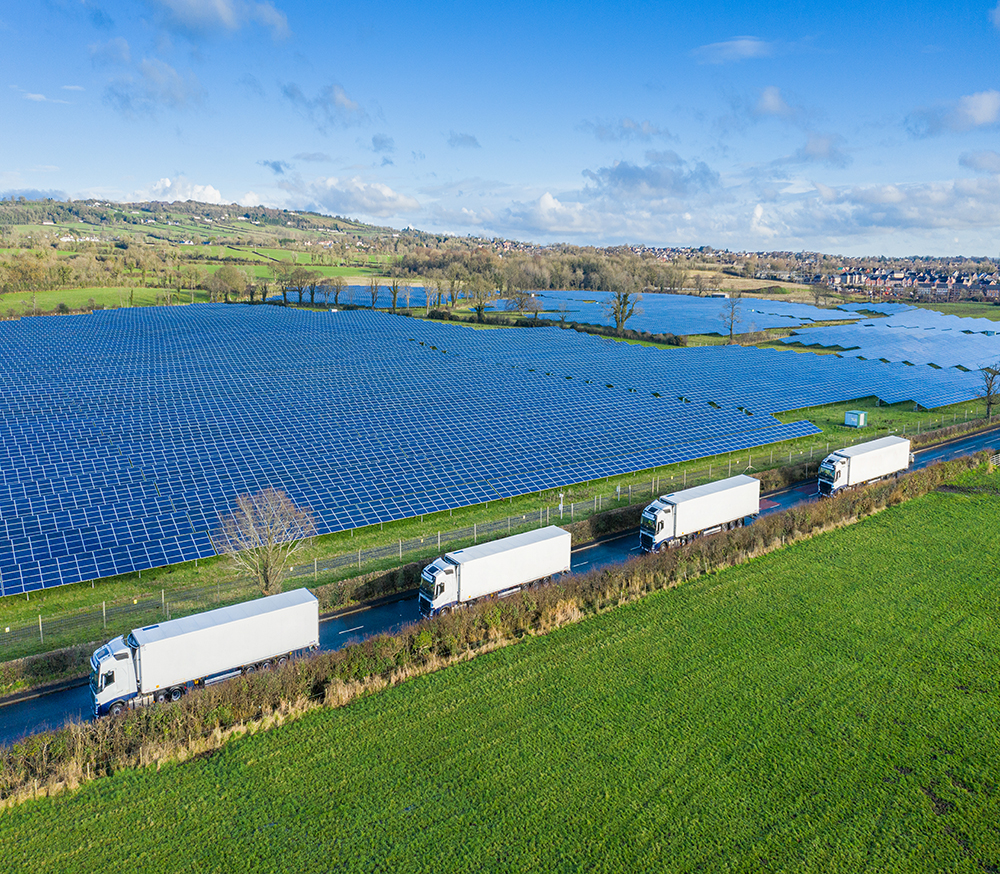
Tell me about the solar panels – how were they designed?
The core technology and the manufacturing process was initially developed by a joint R&D collaboration between industry (Tata Steel), academia (Swansea University) and with support from the Welsh government. The panels have been used successfully in the construction sector for a number of years and the manufacturer, Newport-based MiPV, has had some success in the leisure and blue light sectors. In 2020, Genie Insights initiated a partnership with MiPV to develop a product specifically for the temperature-controlled commercial trailer market and we have been working on other applications since.
The technology behind the panels is quite new, can you tell me how that works and what benefits it has over traditional panels?
Traditionally solar panels have been manufactured using glass or silicon, neither of which are well suited to commercial vehicles because they are too easily damaged for mobile applications and don’t typically perform well enough.
Our photovoltaic solution uses a modern CIGS technology (Copper Indium Gallium Selenide) which is flexible, robust and highly efficient.
CIGS panels are just 3mm thick (bonded) and extremely lightweight, plus they can ‘flex’ with the contour of the vehicle body. This means there is no drag or effect on payload and because they sit flush with the vehicle roof, are much less susceptible to damage than traditional panels that typically require a mounting frame.
By using CIGS, a compound semiconductor, thin-film modules absorb light up to 100 times more effectively than conventional materials and they will start producing energy earlier in the morning and continue for longer in the evening than traditional solutions.
In addition, most solar panels only contain three bypass diodes which significantly limits performance in shaded or cloudy conditions. If one cell is shaded, total power reduces by one-third. In contrast, our product incorporates bypass diodes in every other cell so if a pair of cells is shaded, the current is able to move to the next cell. The only performance loss, therefore, is from the shaded cells. This means our panels will work efficiently in less favourable conditions including low light, shading from buildings, cloudy days and if partially damaged or covered, for example, by snow or bird droppings.
Finally, CIGS is a highly resource and energy efficient technology so has a lower environmental impact on a lifecycle basis than power generated from traditional solar technologies. Once installed, power production using CIGS creates zero greenhouse gases.
How important is it to have a flexible production process, rather than standard one-size-fits-all products?
Our photovoltaic solution is designed to be modular, so we have the ability to manufacture over 140 different sizes ranging from 40w to 360w and with panel lengths up to 5m long. This, coupled with the ability to carry out accurate computer modelling, means solutions can be completely tailored to ensure optimal performance. It is important at the initial consultation stage with customers to fully analyse their electrical draw so that the solution does not over or under perform. Ideally, we want it to perform well in winter but not generate significantly more power than it needs in summer.
Our high voltage 50w panel for refrigerated trailers could be considered ‘one-size-fits-all’ because the research and modelling has now been done for this application.
How long does it take to produce custom solar panels?
There are several different factors to consider when we begin to produce a custom solar panel and the length of time it takes to develop really depends on the complexity of the application.
We first need to ascertain the amount of draw that the vehicle’s ancillary equipment is taking from the battery, which tells us how much wattage of solar we need to maintain a healthy battery state or to power the equipment, depending on the objective.
In some cases, we look beyond the solar panel and work with other key partners to deliver a full system including lithium battery combinations and/or ‘smart’ charge controllers, for example.
If a solution hasn’t been modelled previously, the analysis, development and testing phase can take as little as a few months but ideally, we prefer a solution to be tested during a real-life winter before rolling out to the remainder of a fleet.
How easy are the solar panels to maintain when in operation?
Once the panel is fitted there is almost zero maintenance required.
They have a truck wash friendly EFTE non-stick top coat (similar to Teflon) which means they remain clean, weatherproof and maintenance-free.
What kind of savings can the panels bring to operators? Is there an indicative time for return on investment?
While solar panels on commercial vehicles have been shown to deliver significant fuel savings, this is a bonus in some applications rather than the primary reason for installing them. Genie Insights believes the greatest benefits come from improvements in battery performance and reliability. Solar panels keep batteries charged which reduces battery degradation to improve battery health and longevity.
By ensuring that the battery is continually trickle-charged, the length of time the fridge alternator needs to run is reduced. This will result in reduced fuel consumption, but the real savings are made from reduced breakdown and callout costs, reduced late delivery fees due to battery-related breakdowns and reduced battery replacement costs, alongside the marginal fuel cost reduction.
Some of our customers have been spending tens of thousands of pounds on battery related issues each year so the return on investment is fairly instantaneous.
Having said that, we are currently working on some projects that aim to provide an autonomous power supply via solar so in these applications, fuel saving will key.
With the rise of electric trucks, how big an influence can the solar panels have on maintaining the range of the truck?
This is not something we have modelled yet, but it is certainly something we would be looking to develop in the future.
A large part of tackling climate change will be achieved through the reduction of greenhouse gases emitted by vehicles and we believe a reliable means of keeping batteries charged will be equally as important as the transition to alternative fuel sources. On that basis, it would be a reasonable assumption that our market will grow along with the electric vehicle market.
What has interest in the panels been like from the market?
We seem to have hit the ground running with the solar panels. Within a few months of product launch, we received a number of orders from several major UK and Irish supermarkets and transport operators.
We are coming into our second (calendar) year of selling these panels and so far we have received orders for over 1,000 units. As well as bringing on new customers every month, we are also seeing repeat orders from existing customers for both new vehicles in their fleets and in retrofits to older vehicles.
Some of the earlier customers have now also committed to specifying our panels as standard for all new vehicles going forward so our pipeline is strong, even into next year.
Is there a bit of an image problem for solar panels in the UK? Do some people discount them thinking they don’t work well unless its sunny?
Absolutely there is a negative legacy perception from older solar technology, which just didn’t perform for commercial vehicles. We hope that we are breaking down these perceptions each time a new customer trials our product!
When we are developing a product for a customer, we run performance tests on computer modelling software and these are carried out based on an average winter in Scotland. Typically, if the panel performs efficiently under modelling tests, it has been proven to outperform modelling in real-life. We have completed many successful, real-life trials over the course of the 2020 and 2021 British winters and during operation in the highlands of Scotland.
As well as being able to monitor the battery condition using data from a Bluetooth controller, the proof really has been in the fact that we have had no reports of battery-related breakdowns by any customers since the first ones were fitted in September 2020!
How big could the market for solar panels to power ancillary equipment on a trailer get in the coming years?
The potential and demand for solar panels to power ancillary equipment is only going to increase. As truck and trailer manufacturers add more and more electrical systems to vehicles such as cameras, temperature controllers, tracking systems and tyre pressure sensors etc, this, in turn, will cause an increase in battery drain.
Fitting a solar panel to your truck/trailer will trickle feed the battery and ensure that these ‘parasitic’ drains do not cause the battery to enter deep cycle.
As operators move towards more sustainable fuel sources, solar can play a role in decarbonising transport.
We believe the market size is unlimited since our solution can be retrofitted to the existing vehicle parc in the UK, Ireland and beyond, and the potential applications aren’t just limited to commercial vehicles; we see plant equipment, for example, as a feasible market too.
Could solar energy be used for other commercial vehicle applications in the future?
While our current focus is mainly on battery protection, our medium- to long-term goal is to use solar as the main or sole power supply for applications where it is proven feasible.
As well as our well-established temperature-controlled vehicle applications, our panels are in use on roadside assistance vans currently and we have ongoing trials on passenger carrying vehicles and on other applications, but we are unable to talk about these in too much detail until they are further down the line.
We have also received some financial assistance from InvestNI to develop a completely new solar product (still for use in the commercial vehicle sector) but, again, it is too early to provide details on this at the moment. Watch this space!

